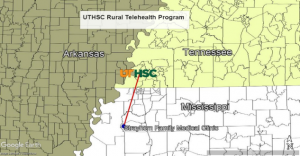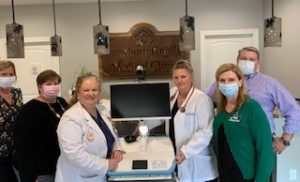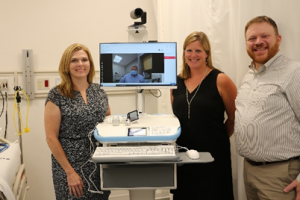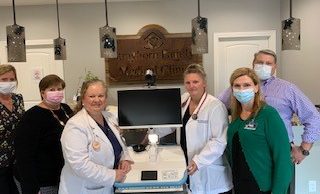Strayhorn Family Medical Clinic recently launched a telemedicine program to better care for its patients in the rural Mississippi River Delta region with assistance from University of

Fig. 1: Location map for Strayhorn Family Medical Clinic

Strayhorn Clinic with the UTHSC
HRSA Advanced Nursing Education Workforce project team
The UTHSC College of Nursing faculty partnered with Strayhorn Family Medical Clinic nurse practitioners to implement and facilitate telehealth for the benefit of the clinic patients, the surrounding community, and to provide telehealth learning experiences for nurse practitioner students rotating in this clinic. “When the COVID-19 pandemic began, many health care providers didn’t know where to begin regarding telehealth. I am so glad we are able to support rural nurse practitioners and clinics to better care for their patients and community. This is the beginning of a long partnership with these clinics,” stated Sarah Rhoads, PhD, DNP, WHNP-BC, FAAN, UTHSC Professor and Primary Investigator of the grant.

Device training at Strayhorn Clinic
The clinic received a telemedicine cart in the fall of 2020 with peripheral devices to use with specialty consults into larger facilities. For example, a specialist can look into a patient’s eyes, ears, nose, and throat with a special camera on the telemedicine cart, and can also transmit heart and lung sounds to a remote specialist utilizing a digital streaming stethoscope. The clinic has hosted multiple patients so far and has several more scheduled to be seen from their homes for telemedicine visits and they are learning more every day on how the addition of technology can assist in providing care. They are currently talking to Behavioral Health partners about how they can host patients from the clinic, especially those patients with transportation barriers or patients that are apprehensive about going into a behavioral clinic. “We can host patients here in their hometown, so they don’t have to drive to Southaven, Mississippi or Memphis for their appointment,“ says Anita Golden, FNP. “Telemedicine gives us the ability to be able to provide that extra level of care when needed.“
While the clinic is in a remote area, providers do see quite a few trauma cases as well. In the past 18-months, the clinic has cared for multiple trauma patients including gunshot victims and numerous farming accidents. Ross says, “You never know what types of medical problems patients will have when they arrive at our clinic. It’s comforting to know that with the simple dialing of a number on our telemedicine cart we can access a specialist if we need that extra level of support while triaging a patient.”

Pictured: Dr. Sarah Rhoads, Karen Nellis, and Mike Carroll from the University of Tennessee Health Science Center
In partnership with the South Central Telehealth Resource Center, UTHSC is developing a Telehealth Training Center in an effort to train, educate and assist more patients and providers with the advanced technology of Telehealth. If you would like more information regarding this project or the Telehealth Training Center, please contact Dr. Sarah Rhoads at srhoads@uthsc.edu or Karen Nellis at knellis@uthsc.edu.





